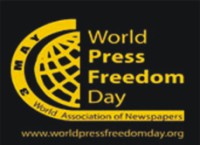For Your Information
World press freedom day
Barrister Harun ur Rashid
 World Press Freedom Day is celebrated every year on 3 May worldwide. It is an opportunity to celebrate the fundamental principles of press freedom; to evaluate press freedom, to defend the media from attacks on their independence and to pay tribute to journalists who have lost their lives in the line of duty.
World Press Freedom Day is celebrated every year on 3 May worldwide. It is an opportunity to celebrate the fundamental principles of press freedom; to evaluate press freedom, to defend the media from attacks on their independence and to pay tribute to journalists who have lost their lives in the line of duty.
The United Nations General Assembly proclaimed World Press Freedom Day in 1993, following a recommendation adopted at the twenty-sixth session of UNESCO's General Conference in 1991.
The Day provides an overview of the global state of access to information and showed how new information technologies allowed for the empowerment of people.
At this year's World Press Freedom Day celebration, UNESCO would like to explore how media freedom and access to information feed into the wider development objective of empowering people.
Empowerment is a multi-dimensional social and political process that helps people gain control over their own lives. Empowerment creates innovation, creativity and improvisation. This can only be achieved through access to accurate, fair and unbiased information, representing a plurality of opinions, and the means to actively communicate vertically and horizontally, thereby participating in the active life of the community.
Press is a mirror of society. Whether a society is healthy, peaceful and democratic can be gauged from the extent whether press enjoys freedom or not. Authorities get a true picture of society and get alerted to take necessary preventive or corrective actions from free press. In that sense, they are benefited by free press.
Furthermore, press acts as a representative of disadvantaged people to air their grievances publicly. There are many instances where remedies were addressed once the press published stories of victims.
Press has made in many countries transparency in decision-making of authorities so as to avoid misuse of power, corruption, nepotism and patronization. No wonder in Britain the press is called a fourth estate, after the parliament, church and monarchy. This implies that press has a vital role in the efficient administration and good governance in the country.
 Every year, Reporters Without Borders establishes a ranking of countries in terms of their freedom of the press. The Worldwide press freedom index list is based on responses to surveys sent to journalists that are members of partner organisations of the RWB, as well as related specialists such as researchers, jurists and human rights activists.
Every year, Reporters Without Borders establishes a ranking of countries in terms of their freedom of the press. The Worldwide press freedom index list is based on responses to surveys sent to journalists that are members of partner organisations of the RWB, as well as related specialists such as researchers, jurists and human rights activists.
The survey asks questions about direct attacks on journalists and the media as well as other indirect sources of pressure against the free press, such as pressure on journalists by non-governmental groups. RWB is careful to note that the index only deals with press freedom, and does not measure the quality of journalism
Freedom of the press is an extremely problematic concept for most non-democratic systems of government since, in the modern age, strict control of access to information is critical to the existence of most non-democratic governments and their associated control systems and security apparatus.
To this end, most non-democratic societies employ state-run news organizations to promote the propaganda critical to maintaining an existing political power base and supress any significant attempts by the press to challenge the approved "government line" on contentious issues.
The write is former Bangladesh Ambassador to the UN, Geneva.